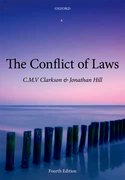Clarkson & Hill, The Conflict of Laws (4th edn OUP, 2011)
 Those who teach or study in private international law will be interested to know that Chris Clarkson and Jonathan Hill have published the 4th edition of their excellent student text on The Conflict of Laws. From the blurb:
Those who teach or study in private international law will be interested to know that Chris Clarkson and Jonathan Hill have published the 4th edition of their excellent student text on The Conflict of Laws. From the blurb:
- Covers the basic principles of the conflict of laws in a succinct and approachable style making this an ideal introductory text
- Explains complex points of law and terminology clearly and without oversimplification, offering both an authoritative and accessible approach to a subject which has changed greatly in recent years
- Offers comprehensive coverage for undergraduate and postgraduate courses on the Conflict of Laws.
- Provides analysis of existing legislation in addition to considering reform proposals and theoretical issues.
New to this edition
- Restructured content better reflects the topic coverage of typical undergraduate courses in Conflict of Laws and allows for extended analysis of the most relevant topics
- Expanded introductory chapter discusses the major changes to the subject and the theoretical issues surrounding it
- Fully updated to reflect the emphasis on issues relating to jurisdiction and the recognition and enforcement of judgments in private international law
- Completely re-written chapter on choice of law relating to non-contractual obligations (Rome II Regulation)
- Substantially revised chapter on choice of law relating to contractual obligations in light of the Rome I Regulation
- Revised chapters on habitual residence and matrimonial causes taking account of increasing case-law (both domestic and European) on the Brussels II Revised Regulation.
The fourth edition of this work provides a clear and up-to-date account of the private international law topics covered in undergraduate courses. Theoretical issues are introduced in the first chapter and, where appropriate, considered in greater detail in later chapters. Basic principles of the conflict of laws are presented in an approachable style, offering clarity on complex points and terminology without over-simplification.
The area of conflict of laws has undergone a profound change in recent decades. Much of the subject is now dominated by legislation, both domestic and European, rather than by case law. In practical terms, issues relating to jurisdiction and the recognition and enforcement of judgments have taken centre stage and choice of law questions have become of less practical importance.
These changing emphases in private international law are fully reflected in this book. The authors provide detailed analyses of the most important commercial topics (civil jurisdiction, the recognition and enforcement of foreign judgements, and choice of law relating to contractual and non-contractual obligations) as well as the most central topics in family law (marriage, matrimonial causes and property law).
OUP has kindly offered a 15% discount to all of our readers: purchase the text direct from OUP’s website, then use promotional code WEBXSTU15 when you add the book to your shopping basket. This takes the book from £34.99 to £29.74. Overwhelmingly recommended.